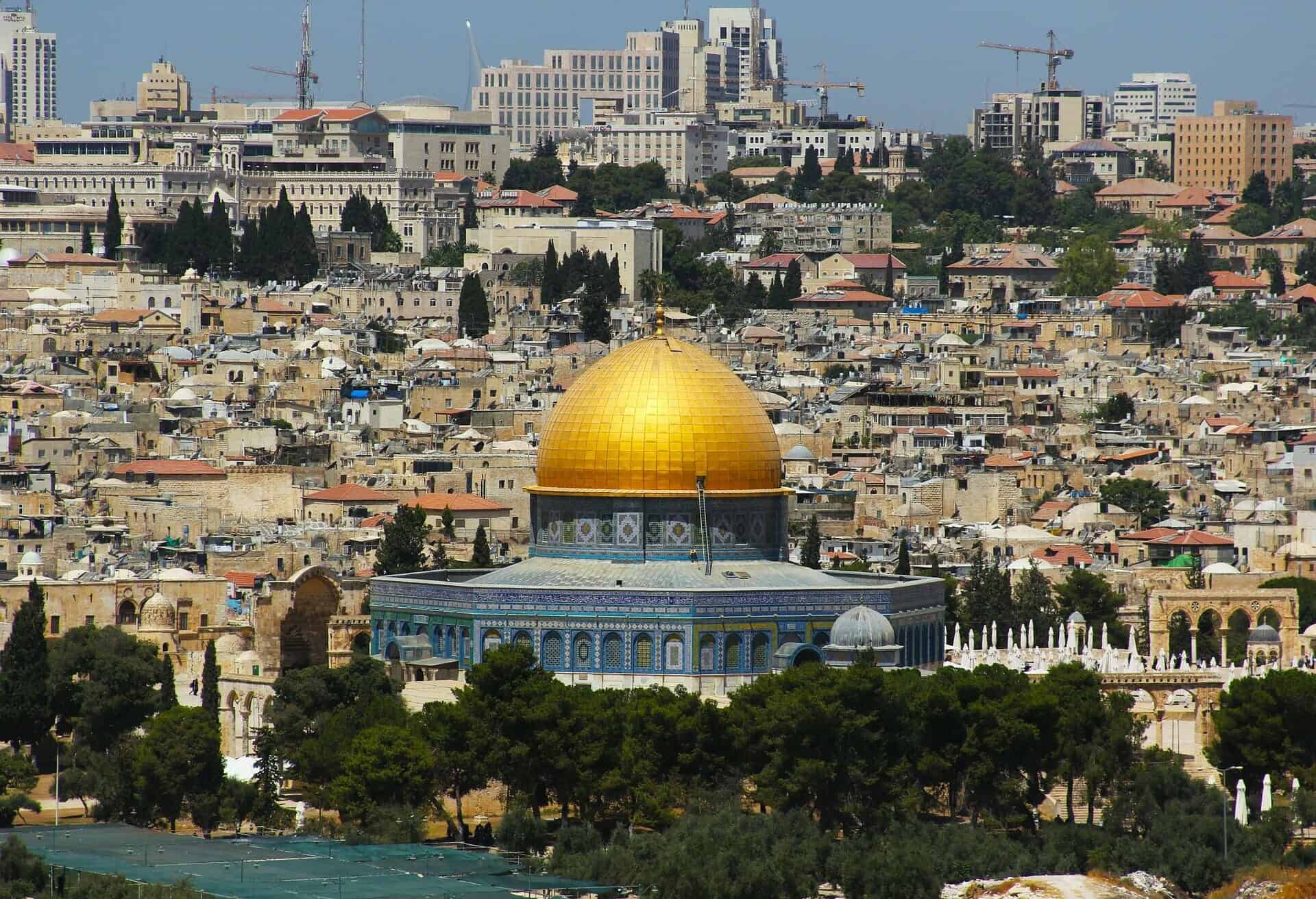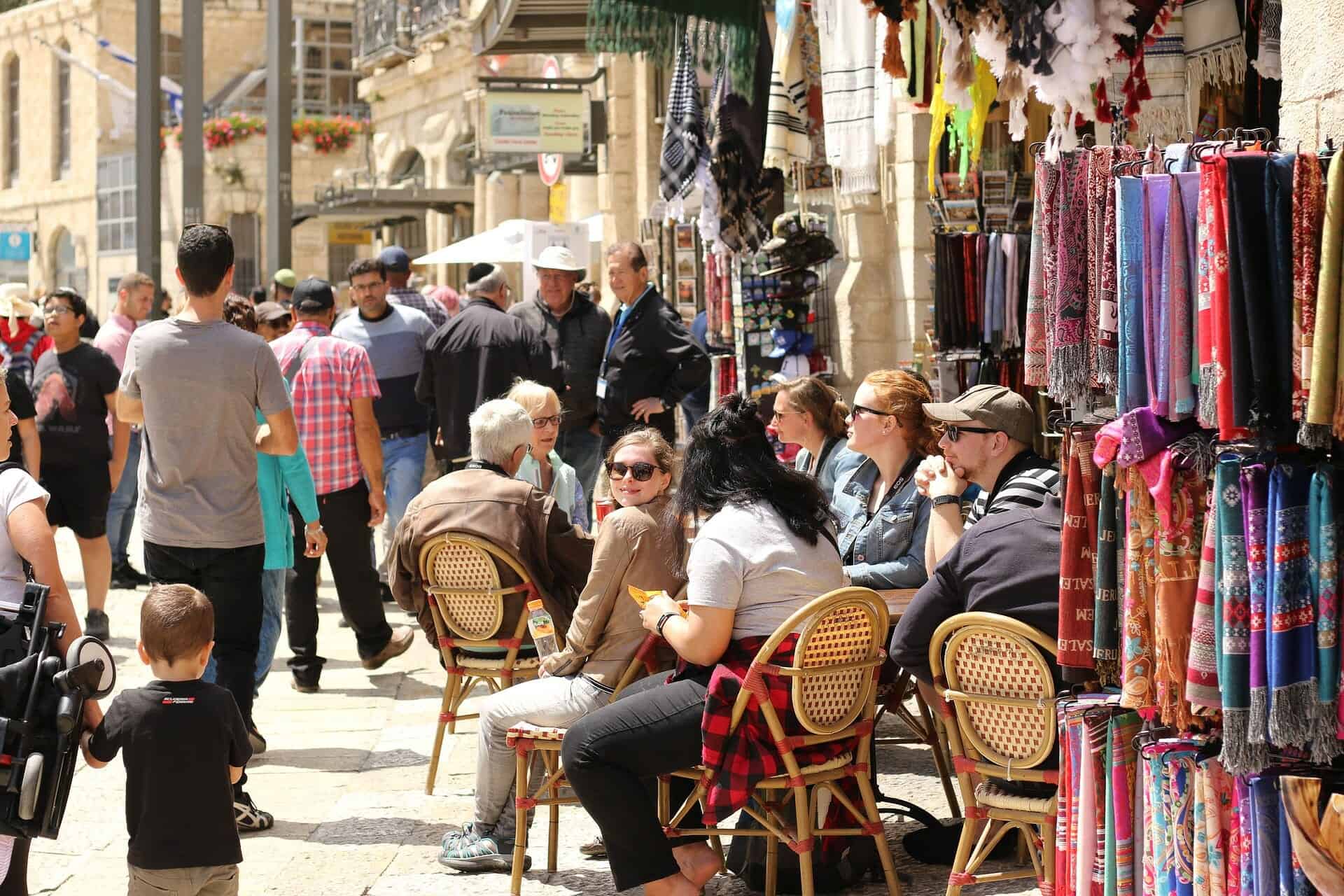Israel is anticipating a significant influx of Emirati and Bahraini tourists when the global tourism industry fully recovers from Covid-19, and is setting its sight on robust revenues and a major boost toward forging its first warm peace with Arab states.
However, when Gulf tourists arrive in Jerusalem, they will need to be aware of the sensitivities in one of the most religiously and nationalistically charged regions in the world.
The Palestinian tourism industry in East Jerusalem also wants Gulf tourists, with tour operators there insisting they are better equipped than Israelis to understand the needs of Muslim tourists intent on praying at the Al Aqsa mosque, Islam’s third-holiest site.
The Israeli tourism ministry estimates that it will take at least a year for the global tourism industry to fully recover from Covid-19. After that, Israel will welcome about 100,000 Emirati and Bahraini tourists a year, according to Ksenia Kobyakov, director of the new markets development department in the ministry.
“We see quite big potential,” she told TRENDS. “A big surge from Gulf countries will come because it’s a new travel destination for them, which was closed before.”
She added: “At the same time, a lot of work should be done by us and the tourism industry, so that the Gulf tourists will come back again after their first visit.”
Israel is keen on welcoming both Emiratis and expatriates who live in the UAE, she stressed.
If the 100,000-tourist-a-year forecast materializes and each tourist spends an average of $1,500 per vacation, Israel will make $150 million annually in revenues from tourists coming from the UAE and Bahrain, said Kobyakov.
Palestinian forecasts of the number of Emirati and Bahraini tourists are more modest.
The ministry of tourism has designed “long weekend” packages for Emirati tourists, intended to bring them to both Jerusalem and Tel Aviv, and have also formulated plans for longer stays.
“Israel is a country of contrasts,” Kobyakov said. “Here thousands of years of history meet young and innovative cities. The combination of Jerusalem, one of the holiest cities for Abrahamic religions with thousands of years of history, and Tel Aviv, a young and vibrant high-tech city with its restaurants and seashore, will excite the Gulf tourists,” she said.
Kobyakov also said that among other sites, the imposing Hassan Bek Mosque near the Tel Aviv shoreline would show Emirati tourists that Israel was “a country of contrasts where everything meets everything.”
The mosque is all that is left of a Palestinian neighborhood whose Arab residents became refugees during the fighting surrounding Israel’s establishment.
Palestinians view the Emiratis as being motivated to come primarily to visit and pray at the al-Aksa mosque and other Muslim holy sites, said Tony Khashram, chairman of the board of the Holy Land Incoming Tour Operators Association, which represents 60 private-sector tourism offices in East Jerusalem and the Palestinian Authority areas.
“We will be very happy if 100,000 a year come, but I think this estimate is overly optimistic because circumstances here keep changing,” said Khashram, referring to larger political ups and downs in the holy city, where Israeli and Palestinian nationalisms often collide.
Israel captured East Jerusalem, home to holy sites of Judaism, Christianity, and Islam, during the 1967 Middle East war and annexed it in a move considered illegal by many in the international community. Many Palestinians view themselves as living under foreign occupation.
Emirati tourists will probably have to be prudent and polite to avoid getting caught up in this political maelstrom.
For Palestinian tour operators, who are reeling from two years without tourists, the need for revenue has trumped politics when it comes to the Emirati visitors. They are anxious to make them feel welcome and to put aside the Palestinian leadership’s differences with the UAE a year ago over the Abraham Accords that established official Emirati-Israeli relations.
“Tourism is good for the East Jerusalem economy. It’s good for service providers and it’s good for the Emirati pilgrims,” said Khashram.
He added that during recent meetings including East Jerusalem business and civil society leaders, Muslim religious officials, and “local nationalists,” it was decided to welcome Emirati tourists and to rule out any form of hostility.
“We want them to come as tourists. East Jerusalem lives on tourism. As operators, we want to make money and survive,” said Khashram, a Christian Palestinian whose family traces its roots to Jerusalem eight centuries ago.
Emirati tourists will be made to feel completely comfortable unless they offend local sensibilities by choosing to visit al-Aksa mosque in conjunction with the Israeli police rather than through coordination with Muslim authorities, he said.
Their visits to al-Aksa, situated on an esplanade that is also Judaism’s holiest site, should be with Muslim guides, he said.
“We know the Muslim market and how to organize a Muslim itinerary with an authentic visit,” said Khashram, who recently visited Expo 2020 Dubai to forge ties with Emirati tourism offices.
“A Muslim guide takes a Muslim group into al-Aksa and prays with them. It’s a wonderful experience.”
To accommodate the Gulf tourists, some Israeli tour companies have hired Muslim staffers, according to Khashram.
And Israel is trying hard to make Emiratis feel comfortable as it breaks new ground on hosting Muslim tourists on a large scale, said Kobyakov.
Hotels have been advised of the need to place members of large Emirati families on the same floor and not to stock alcohol in the minibars of their rooms. And the Gulf tourists will be able to choose from among kosher and halal restaurants.
As for safety, Kobyakov said there was nothing to worry about. “Safety is the first priority of our country. Tourism is not about conflict. It’s about connections. It’s about peace. Tourists from the UAE will feel completely safe in Israel. We are working closely with authorities to ensure it will be completely safe for Emiratis in all Israeli touristic sites.”
She added: “Israelis are so excited to welcome tourists from the Gulf. They are waiting, there is so much excitement from the Israeli side and Israelis will be very welcoming.”
However, in a country known for its deep political divisions and debates, not all Israelis are happy about the itinerary for Emirati tourists drawn up by the tourism ministry and obtained by TRENDS. The ministry, it turns out, wants Emiratis to visit an archeological park in East Jerusalem run by Jewish fundamentalist settlers.
The government and the settlers term the area in which the park is situated the City of David, after the biblical king they say established the Israelite kingdom there some 3,000 years ago.
The settlers running the park believe the area should be Jewish in character even though it is currently a Palestinian neighborhood called Silwan.
Peace Now, the Israeli group seeking a peace agreement with the Palestinians, blasted the plan, with senior staffer Hagit Ofran telling TRENDS: “There is no end to the cynicism of the tourism ministry which seeks to bring Emirati tourists to a tour in exactly the place where Israel is erasing the Muslim and Palestinian presence of those living there.”
The UAE in May joined international objections to Israeli government and settler plans to evict Palestinian families from another East Jerusalem neighborhood, Sheikh Jarrah.
But Yonatan Yosef, a pro-settler member of the Jerusalem municipal council who backed the planned evictions in Sheikh Jarrah, voiced support for the tourism ministry’s plan to bring Emiratis to City of David.
He told TRENDS: “They should visit and know the history of the people of Israel. We extend a hand of peace to them. I know the Emirates has nice sites and they should see our sites too. I say to them, come and visit.”
Khashram, the East Jerusalem tourism leader, predicted Emirati tourists would not enjoy the settler park and would stop visiting it. “After six months, the Emiratis will know what’s going on and the itinerary will change because it is the visitor who decides,” he said.








